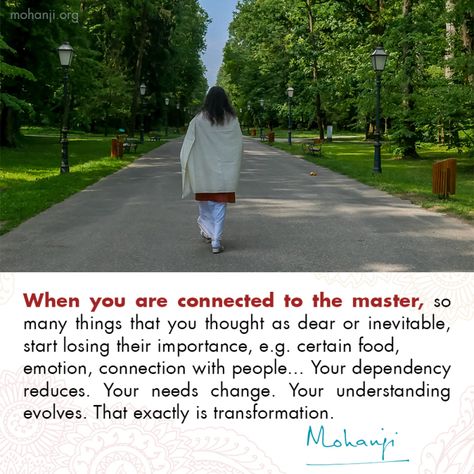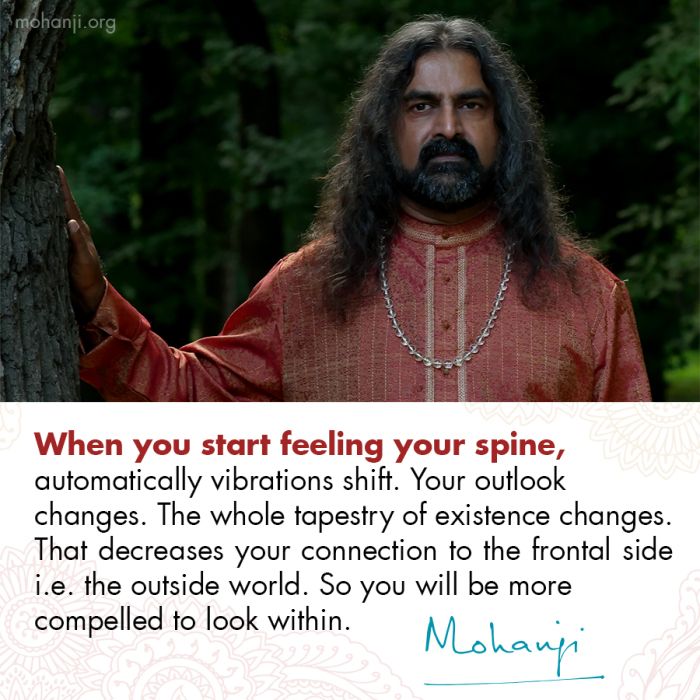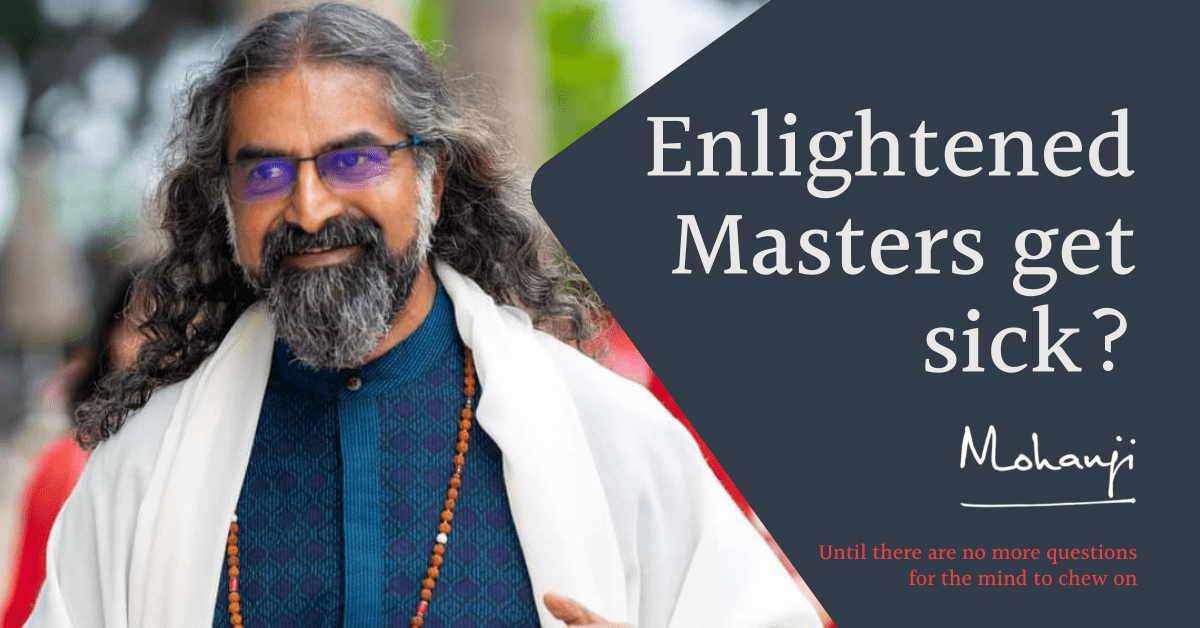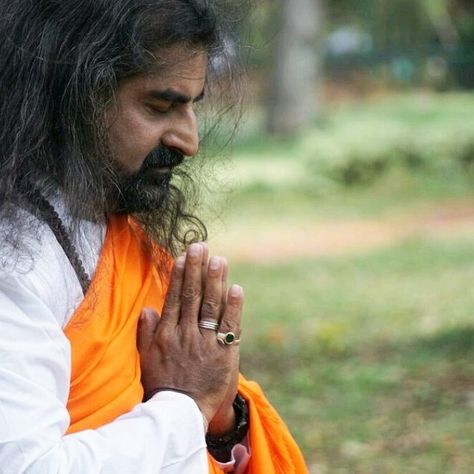Do Masters get sick?
Physical illnesses have so many factors. Once you’re fully aligned and fully occupied with existence (means the whole consciousness); you’re probably not even looking at your body as something very important.
From what I have seen and what I’ve experienced, most of these people hardly care about their bodies. They have a body, so all the aspects connected to the body will be there. Everything has its nature. The body has its nature. The body needs rest; it has needs like water, food.
All those things are part of it, but then again, they are not bound by it. So, they more or less ignore it; the body is okay.

Purposeful existence
But what are you here for? Like Bhagavan Krishna said,
‘Yada yada hi dharmasya glanirbhavati bharata’
Whenever there is a time of decay of dharma on Earth, I happen.
So purposeful existence, existence for a purpose, with full clarity, a clear picture is needed. They know that this body has a duration; there’s a beginning and an end. Within this time, they are in a hurry to speed it all up, to finish whatever you have come for. Not much of a care for the body.
Karmic ailments
The ailments and things are connected to usually the external world; it’s not their karmic ailments. There are two types of things: what you carried forward, the patterns you brought forward from other lives to this life, which causes certain ailments. The other is what you have collected, and you have churned. That happens.
Masters who are fully aligned who have no karma may collect a lot of things from outside. And probably they’ll take it in their body, and they’ll churn it. A person whom they are deeply connected to, imagine they have a problem which will take 40 years for cleansing, the Master may take it on him and clean it in 40 days.

Master’s role
Similarly, there are so many factors, the psychosomatic factors, go through the Master, and the Master may respond in that way. But that doesn’t mean that the Master is a victim of it. It’s like a service; his existence is a service. This is another aspect of service.
When a person is in expanded consciousness, it’s always for the larger good, not for individual pleasure. Because their whole operation or whole existence is for the larger good, and even the faculties associated with the body, everything is for the larger good; it’s all service – 24 hours, 365 days it’s service.
In that mode, what happens to the body, what goes through it, how he performs, it’s difficult to say. Because it’s not from a pattern, there won’t be any pattern. It will be as spontaneous as a river flowing, you know, or the sun shining. The sun gives rays to a gutter and also a garden. Like that, it will continue to flow.
Dimension beyond boundaries
When your dimensions expand beyond your body into a much larger dimension, you can’t predict that this is the boundary. There’s no boundary, then. Everything is as per the flow. So what he does, why he does it, we can’t predict; it’s a flow.
Society may not understand it. Sometimes society looks at them as eccentric or mad. You know society looks at them, through the eyes of society, how they are. They don’t understand.
Sai Baba was considered mad by many people. He used to talk to himself; he used to talk to the sky. But today, 100 years after he left the body, we know he was a powerful Master. It took almost 100 years for people to recognise that. That happens.
When Jesus was in his body, people were busy killing him. They said he was spoiling the minds of the youth and assassinated him. But after that, religion was formed out of him. This is the society; society may not understand its contemporary. It’s not easy because the operating level is different.
Purpose oriented
They come with a purpose, and the purpose drives them. The fuel of their existence is the purpose; it’s not easy to understand. What they use their body for will be the immediate purpose, and they may take on cancer, or they may take on a tumour, or they may take on any disease, so that’s something else is cleared in the society. It’s possible.
The ailment of a teacher you can’t measure as a karmic ailment; that’s different. A karmic disease is different, a disease for the sake of cleansing a larger matter that is different. It’s not the same yardstick.
Bodhidharma
In this context, as part of this, if you look at all the past Masters, like when Bodhidharma visited China, somebody had told the village before he came that evil would come into the village. A witch doctor told the village, ‘Beware; evil will come into the village.’
So when Bodhidharma came to the village, they decided that’s the evil, so they drove him away. He went and stayed in the forest. Because the village would not accept him, he went and stayed in the forest. And then, soon enough, an epidemic came into the village—Smallpox or chickenpox, something like that. People started dying. And what they were doing, all the infected people, they threw them into the forest because they didn’t want the rest of the people to be affected.
What Bodhidharma did was he took everybody to his place and healed them. And finally, there were more people in the forest than in the village, because so many people got affected. They were all healed. Then Bodhidharma came to the village with all the healed people. They said, ‘This man healed us.’ Then they realised he was a great doctor.
They accepted him. They thought he’s a doctor and he started healing people, he was doing the work of a doctor. After a while, another village attacked this village, and they did not have enough weapons to fight them.
Bodhidharma was fighting the war, he did not have much space to fight or equipment to fight, but he stood on one toe while all the people around him and defeated the army. Then the villagers understood he is a great warrior, a great Master, a good doctor, a good warrior etc.
He is the founder of Shaolin Temples. They decided that he was very important to the village. Then after a while, when everything was settled, he had done all he had to do. He then told the villagers, ‘Now, I have completed my work. I’m going.’
Then the villagers, the senior people, got together. They said, “We can’t let him go. He has been adding value to the village; we can’t allow him to go.” They went to him and said, “Don’t go.” He said, “No, my job is done.”
Please understand, no Master ever spends even a minute extra once the job is completed. Because it’s not for the pleasure they are existing, it is for the sake of purpose. So if it is a pleasure, you can be addicted to certain pleasures for a long period of time, but that’s not the important thing here. Purpose, when the purpose is completed, the shutter is down.
He was planning to go. Then, what did they do? They brought him food with poison in it. Because they said, his body should be there in the village, at least. When Bodhidharma got the plate, he looked at it, he said there is poison in it, he understood it. They said, “Yes, we had put poison in it.” “So you want the body?” They said, “Yes”. He ate it, and he left the body there. It was as simple as that. There was no tragedy for him to leave the body.
The same thing with Socrates, when they gave him the poison, he said, “It is better to drink the poison altogether, than drink a little bit of it every day from the society.” It is better you drink it all together so that you are finished; rather than every day, a small portion from society. It takes a long time before you die from it.

Live for the day
This is how a Master sees the world. No possessiveness, no possessions, purpose. When you look at the world only through the eyes of purpose, there are no fringes. There is no confusion. Today is the only day; tomorrow, you will do what you have to if it happens. But today, you do your thing. Tomorrow is not in our hands, and it doesn’t matter.
Clarity
If you start looking at the world through the eyes of purpose, the result is clarity, absolute clarity.
That is what we were told when we were at the tomb where the Prophet John’s hand is kept in Montenegro.
Prophet John
Prophet John was a big Master, an Avadhoota, somebody who had seen beyond. He said the one who is coming after me is greater than me (about Jesus.) And he baptised him.
When his head was to be chopped off, he said, “What are you chopping off? This body is not mine anyway. You can chop off whatever you like; you can’t chop me, I am indivisible, I can’t be divided. I am always full and complete. You cannot divide me; I’m always eternal; I am full. This body you’re talking about, you take it. If you want to cut it into thousand pieces, I have no problem because it is something which I am going to drop anyway.”
That is the way a Master looks at the world and life. If it is understood clearly, you have understood life and the level where a Master operates very clearly. That clarity is essential. Alignment automatically happens. Then we will look at our positions and possessiveness, our connections, likes and dislikes, everything differently. Purpose – just purpose.
Transcribed by Ulla Bernholdt
Proofread by Rekha Murali


